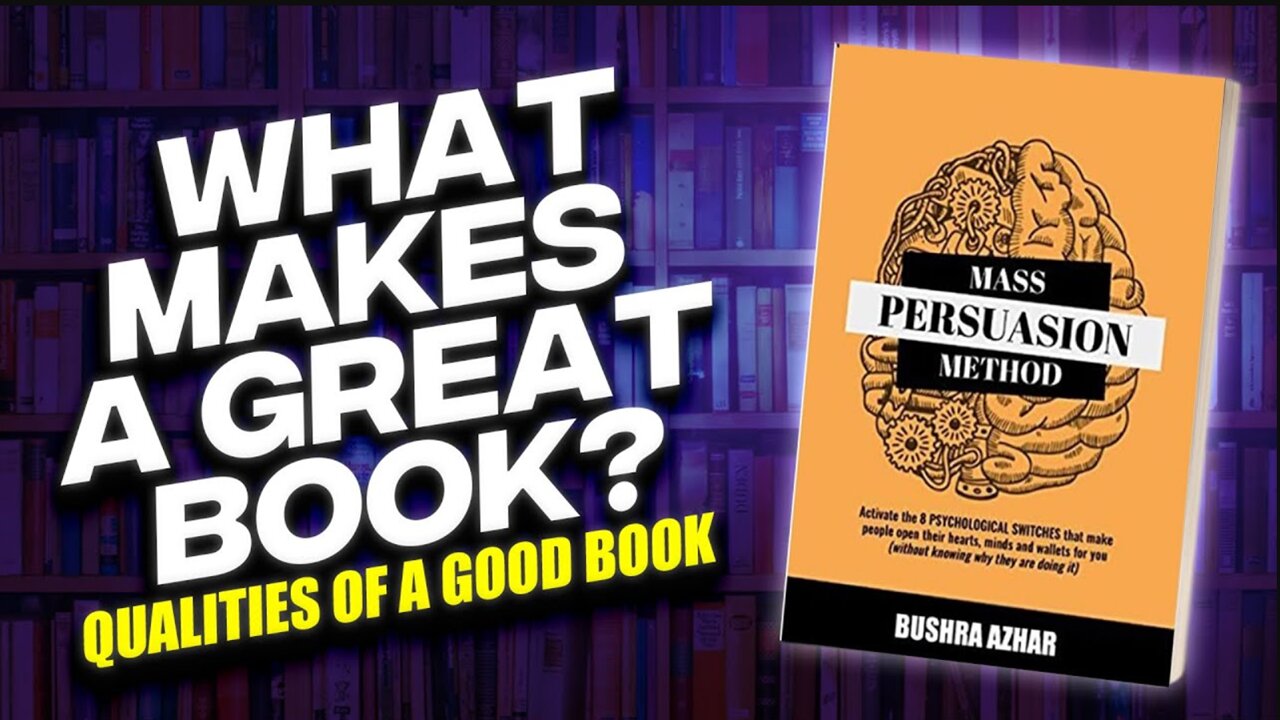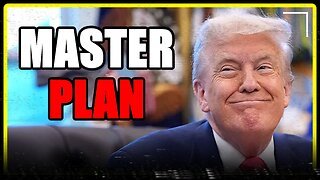Premium Only Content

What Makes a Great Book? Celebrity Ghostwriter and Writing Coach Joshua Lisec Reveals Secrets
👉 Write a useful book that converts readers into high-paying clients. Free training shows you how: https://lisecghostwriting.com/golden/ 📖
Every aspiring author asks the same question at some point: What makes a great book? In this revealing session, celebrity ghostwriter and writing coach Joshua Lisec uncovers the core principles that separate forgettable titles from those that captivate readers, dominate categories, and deliver lasting impact. Drawing on his experience ghostwriting bestselling works such as Bushra Azhar’s Mass Persuasion Method—a standout in The Persuasion Revolution—Lisec shares what truly makes a book not only good but unforgettable.
A great book, Lisec explains, begins with clarity of purpose. There are already tens of thousands of titles in every genre, so before writing a single page, authors must ask: Why does this book need to exist? Understanding that purpose is the foundation for everything that follows—from shaping the concept to defining its audience. When Bushra Azhar approached Lisec with her idea for Mass Persuasion Method, there were over 60,000 competing books in marketing and sales. Yet none had merged the psychology of persuasion with online business strategy in a simple, instantly applicable, and high-converting way. That unique combination was the spark that made her book a success—and an example of the qualities of a good book in action.
What makes a good book isn’t just about information—it’s about connection. The best books, Lisec explains, solve a problem or fulfill a need that readers already feel deeply but haven’t found an answer to. Successful authors identify those unspoken challenges and position their ideas as the solution. For instance, one of Lisec’s clients in South Africa wrote a book for aspiring marketers. Instead of writing a generic business manual, they tailored the narrative directly to the ambitions and frustrations of that audience. The result was a natural fit—when readers discovered it, they felt as though the book had been written specifically for them.
That emotional fit is one of the most critical qualities of a good book. Readers don’t just buy books; they buy transformation. They’re drawn to ideas that resonate with their personal goals, professional challenges, or unmet desires. Lisec’s approach as a writing coach ensures that every project connects a writer’s message with the reader’s motivation.
The more aligned those two are, the more effortlessly a book stands out in crowded markets.
At the heart of Lisec’s method lies persuasive writing. He teaches that every book—whether it’s about marketing, leadership, or personal growth—should function as an engine of influence. It’s not enough to share what you know; you must present it in a way that compels belief and inspires action. This is precisely what made Mass Persuasion Method so effective. It wasn’t written as a dry business text—it was crafted as a persuasive story. The tone was conversational yet authoritative, filled with emotion, case studies, and moments of revelation that drew readers in and kept them turning the pages.
For authors aiming to write a good book, Lisec emphasizes that readability is just as important as originality. A book should flow naturally, guiding readers from one idea to the next without friction. He advises against writing something that feels like a textbook. Instead, authors should build a narrative that’s engaging, emotionally charged, and layered with persuasive writing techniques. The balance between storytelling and structure, he says, is what turns complex ideas into page-turning content.
Lisec also highlights a critical but often overlooked element of great writing: intellectual courage. To write a good book, an author must be willing to challenge conventional wisdom and dismantle myths that dominate their industry. Readers are searching for fresh perspectives, not recycled advice. That’s why Lisec urges his clients to take a “wrecking ball” to bad information—to confront the “BS” and outdated thinking their audiences have been fed. When a writer dares to speak the truth with authority and evidence, they don’t just inform—they redefine the conversation.
That same boldness applies to how authors market your book once it’s finished. Lisec explains that great books don’t rely on luck to find readers—they’re strategically positioned for discovery. The process of book marketing begins long before publication, with a concept and structure designed for visibility. From keywords to titles, every choice is deliberate. When a book appeals to a large enough market while delivering something fresh and specific, platforms like Amazon begin organically marketing the book through recommendations and algorithmic boosts.
For writers who want to sell more books, Lisec’s advice is clear: stop thinking like an author, and start thinking like a strategist. A truly great book doesn’t just read well—it’s built to perform. His book marketing strategies focus on connecting the right message to the right market through authenticity and positioning. That’s how a self-published author competes with traditional publishers—and wins.
The video also explores the steps to writing a book that readers can’t put down. From the initial book idea generator phase to the refinement of chapters and subheads, Lisec’s process ensures that every section serves the reader’s journey. He shows how to weave headlines and transitions that maintain attention, while ensuring that every story, example, and takeaway contributes to the book’s central theme. Whether working on nonfiction or narrative-driven business books, his system helps writers get published with confidence and purpose.
Lisec’s role as both a celebrity ghostwriter and writing coach gives him unique insight into what it takes to create standout manuscripts. He’s written for high-profile clients, entrepreneurs, and experts who understand that their book isn’t just a creative project—it’s a tool for influence. By combining storytelling with strategy, his work demonstrates the enduring qualities of a good book: clarity, originality, emotional resonance, and measurable impact.
For self-published authors, this discussion offers practical direction on book marketing for self published authors. Lisec outlines how to structure a book so it naturally attracts readers through value and persuasion, rather than relying solely on advertising. He stresses that every book should feel like a one-on-one conversation between the author and the reader—a dialogue that educates, entertains, and motivates. That personal connection is the true engine of word-of-mouth growth and long-term sales.
Even established authors can benefit from revisiting what Lisec calls the fundamentals of mass persuasion. A great book doesn’t simply inform—it persuades, guides, and transforms. Whether writing for the persuasion revolution audience or developing a fresh take on an existing genre, the author’s job is to translate expertise into emotional truth. When done right, this balance allows books to rise above the noise, sell more books, and generate lasting influence across platforms.
Ultimately, Lisec’s insights reveal that what makes a good book is never luck—it’s strategy. Every word, every chapter, every story must serve the reader’s journey. Authors who embrace this mindset don’t just publish—they lead revolutions in thinking, conversation, and change.
Through this masterclass in writing and persuasion, Joshua Lisec offers more than theory; he delivers a blueprint for anyone ready to create their best work yet. From concept to completion, from book marketing services to long-term visibility, he shows exactly how to build books that stand out, connect deeply, and endure.
For authors at any stage, this conversation is both a wake-up call and an inspiration: the power to write a great book lies not in luck or talent, but in understanding readers—and giving them something that matters. That is the essence of what makes a great book.
-
 12:54
12:54
Brad Owen Poker
13 hours ago $1.79 earnedI Make Final Table! I’m Going To $10,400 WPT World Championship!!
10.8K1 -
 10:00
10:00
TheMightyMcClures
22 days ago $1.31 earnedWe Fed 500 Families!
12.3K4 -
 6:23
6:23
The Shannon Joy Show
14 hours agoWas Covid a MILITARY OPERATION?
11.9K7 -
 LIVE
LIVE
The Bubba Army
23 hours agoTRUMP SIGNS EPSTEIN BILL! - Bubba the Love Sponge® Show | 11/20/25
1,517 watching -
 27:24
27:24
DeVory Darkins
22 hours agoTrump secures RECORD BREAKING INVESTMENT as Charlotte Schools issue SHOCKING Update
38.5K49 -
 34:15
34:15
ZeeeMedia
17 hours agoPolice Demand Government Critic Hands Over His BLOOD | Daily Pulse Ep 147
68.8K36 -
 1:47:50
1:47:50
Side Scrollers Podcast
17 hours agoSide Scrollers Presents: OVERCOCKED
38.4K12 -
 3:33:22
3:33:22
HLL8LLY
5 hours ago $1.47 earnedBattlefield 6 Live Gameplay
11.8K2 -
 34:04
34:04
Code Blue Cam
20 hours agoTeen Plays Real-Life GTA… Ends Horrifically
29.3K11 -
 13:33
13:33
MattMorseTV
18 hours ago $36.63 earnedThey actually TOOK THE BAIT…
88.8K72